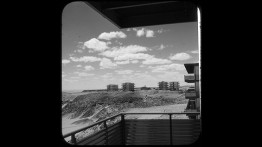Eleanore Pettersen Lecture | Samia Henni: Colonial Toxicity — France's Nuclear Heritage in the Sahara
Tuesday, April 26, 2022, 12:15 - 2:15pm

Fig. 1. France's Saharan Center for Military Experiments, Reggane, Algerian Sahara, December 1960. Copyright Jean-Michel Pinaut / SCA / ECPAD
This lecture will be conducted in-person in room 315F and through Zoom.
For Zoom attendance, please register in advance here.
For In-Person attendance, please register in advance here.
Between 1960 and 1966, the French colonial authorities detonated their first nuclear bombs in colonized Algerian Sahara. They secretly built two military bases: one in Reggane, in the Tanezrouft Plain, approximately 1,150 kilometers south of Algiers, and another one in in Ekker, in the Hoggar mountains, about 600 kilometers south-eastern of Reggane. The use of the Sahara as a nuclear firing field spread radioactive fallout across Africa and the Mediterranean and caus¬ed irreversible contaminations among human and nonhuman bodies, natural and built environments. This talk examines the spatialities and temporalities of France’s colonial toxicity in the Sahara and explores the lives and afterlives of radioactive debris and nuclear wastes.
The presentation will be followed by a conversation moderated by Nora Akawi.
Samia Henni is an architectural historian and Assistant Professor of History of Architecture and Urbanism at the Department of Architecture, College of Architecture, Art and Planning, Cornell University. She is the author of the multi-award-winning Architecture of Counterrevolution: The French Army in Northern Algeria (gta Verlag, 2017, EN; Editions B42, 2019, FR), the editor of War Zones (gta Verlag, 2018) and Deserts are Not Empty (Columbia Books on Architecture and the City, 2022), and the maker of exhibitions, such as Housing Pharmacology / Right to Housing (Manifesta 13, Marseille, 2020) and Discreet Violence: Architecture and the French War in Algeria (Zurich, Rotterdam, Berlin, Johannesburg, Paris, Prague, Ithaca, Philadelphia, Charlottesville, 2017–22). She received her Ph.D. In the History and Theory of Architecture (with distinction, ETH Medal) from ETH Zurich and taught at Princeton University, ETH Zurich, the University of Zurich, and Geneva University of Art and Design. Her teaching and research interests include the history and theory of the built, destroyed, and imagined environments in relation to colonialization, displacement, gender, natural resources, nuclear weapons, and wars. Her current book project examines how the French military authorities toxified and transformed the Saharan territories and environments in the aftermath second world war. Henni is the Albert Hirschman Chair (2021-22) at the Institute for Advanced Study in Marseille and the Co-Chair (2021-22, with Ralph Ghoche) of Beyond France, The University Seminar at Columbia University.
Nora Akawi is Assistant Professor of Architecture at The Cooper Union. Her research and teaching lie at the intersections of displacement, erasure, and memory with architecture—drawing from migration and border studies, mapping practices, and archive theory. Prior to joining The Cooper Union, Nora taught at Columbia University’s GSAPP, where she was director of Studio-X Amman. Most recently, Nora curated Al Majhoola Min Al-Ard (This Land’s Unknown) at the Biennale d’Architecture d’Orléans 2019, and co-curated Friday Sermon, the Bahrain Pavilion exhibition in the Biennale Architettura 2018 in Venice. She co-edited the books Friday: An Assembly (2018) and Architecture and Representation: The Arab City (2016). Recent publications include “Mapping Borderlands: Drawing From the Jawlan” in GTA Papers 2: War Zones (ETH Zürich, 2019), and “Worlding From the South” in Manifesta 12: Palermo Atlas, (OMA / Humboldt Books, 2018).
The Eleanore Pettersen Lecture, established through a generous gift to the Irwin S. Chanin School of Architecture, is dedicated to the voices of women in architecture as a lasting tribute to Ms. Pettersen's significant impact in the world of architecture and her love of The Cooper Union. Pettersen was one of the first women to be licensed as an architect in New Jersey, and developed a successful practice there that spanned over fifty years. Lectures in this series have been given by Toshiko Mori (2005), Phyllis Lambert (2006), Elizabeth Wright Ingraham (2008), Billie Tsien (2009), Francine Houben (2011), Sarah Wigglesworth (2013), Farshid Moussavi (2014), Mabel Wilson (2020), Leslie Lokko and Sumayya Vally (2021), and Samia Henni (2022).
This event is free and open to the public.
Please refer to our building access COVID-19 policy below:
Bring proof of your COVID-19 vaccination. Proof of vaccination (+ booster)
is
required for all guests and must be provided to the security desk in our
building lobbies. A photo of your vaccination card is acceptable and for
New York City residents, the Excelsior Pass is also acceptable.
Wear a mask. N95, KN95, KF94 or a disposable surgical facial mask covering
your mouth and nose is required for all party member of all ages while on campus.
Stay safe and keep a 6-foot distance. We ask that you maintain a
6-foot
distance from all members outside of your party while on campus.
Please reschedule if not feeling well. If any members of your party
are not
feeling well, please stay home and reschedule your visit.
Located at 7 East 7th Street, between Third and Fourth Avenues




